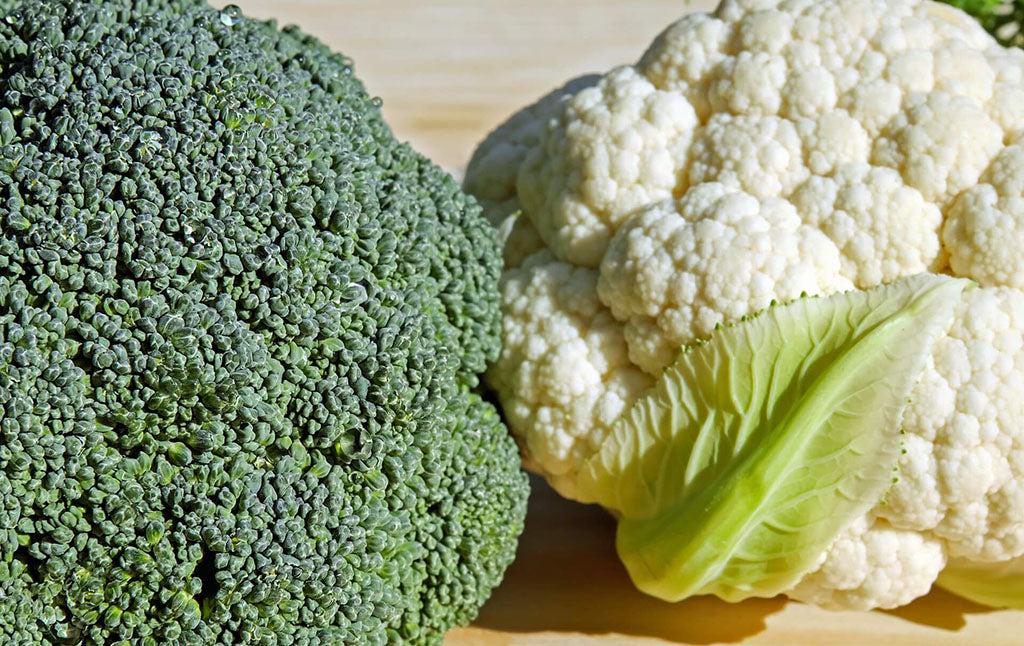Summary: Can dogs eat broccoli? What about cauliflower? In this blog, learn whether dogs can eat broccoli and cauliflower, how much they can have and what risks or benefits they may have for canines… Can Dogs Eat Broccoli And Cauliflower? Some humans love broccoli, some hate it. The same for its relative cauliflower; both […]
Can Dogs Eat Broccoli And Cauliflower?

Summary: Can dogs eat broccoli? What about cauliflower? In this blog, learn whether dogs can eat broccoli and cauliflower, how much they can have and what risks or benefits they may have for canines…
Can Dogs Eat Broccoli And Cauliflower?
Some humans love broccoli, some hate it. The same for its relative cauliflower; both part of the cruciferous family. But, for the pet parent fans of these vegetables who always have one of the two in their kitchen – can you share these little tree-like veggies with your pooch? Are broccoli and cauliflower safe for dogs to eat…?
Can Dogs Eat Broccoli?
Yes, in small quantities. Dogs can eat both the stalk of the broccoli as well as the floret, as long as the stalks are cut into small pieces, otherwise, they pose a choking hazard. Your pup can be served broccoli in this way, raw or cooked. Frozen broccoli is also OK.
If you serve your dog too many broccoli florets, the small molecules present in this area of the plant called isothiocyanates may irritate your dog’s tummy and bring on nausea, gas, diarrhea or bloat (the latter being incredibly dangerous for dogs). If you serve your dog too much of a broccoli stalk, the high levels of fiber present in this area of the plant may also cause flatulence or loose stool. This is why small portions are advised.

Can Dogs Eat Cauliflower?
Yes, in small quantities and the same rules as broccoli apply when feeding cauliflower to a dog – small amounts, cut up, cooked or raw (or frozen!).
For both broccoli and cauliflower, make sure you’re not cooking them in fats like butter or oil or covering them in cheese, salts, or other flavorings as these can all cause problems for a dog. Plain and chopped is perfect!
A serving of either cauliflower or broccoli once a week is generally a good guide in terms of frequency and allowance for a pooch. Literally add what you would consider a bitesize amount for your dog on top of their food, or chop up small pieces and allow them a small nibble as a treat or a reward.
PetLab Co. Pro Tip: Own a puppy? Tempted to let them chew on the stem of a broccoli or cauliflower to help their teeth? Our advice is to not do that. The fiber content may be far too high for a puppy’s digestive system to cope with and they may also swallow it in large chunks which may cause an intestinal blockage. Read our blog on how to help with puppy teething here.

Is Broccoli Good For Dogs?
Broccoli is nutrient-rich. It contains fiber, vitamin K, vitamin C, folic acid, magnesium, sodium, and chromium potassium which can all benefit a dog’s health.
Is Cauliflower Good For Dogs?
Like broccoli, cauliflower is dense with nutrients too. It contains folate, beta-carotene, vitamin C, vitamin K, fiber, and multiple minerals like potassium, calcium, manganese, and magnesium, whilst also containing an abundance of antioxidants. All of these can benefit your dog’s health too.
You should always take it slowly when introducing any new food to a dog to avoid upsetting their stomach – particularly with puppies. As discussed above, introduce cauliflower or broccoli to your dog and monitor their response before considering continuing to feed low quantities of it to your dog once a week. As with humans, all dogs will react differently to different foods so always be mindful of this when trying them on new foods, snacks, and treats regardless of whether they’re deemed safe. If you have any concerns over your dog’s health after they consume broccoli or cauliflower, contact your vet.
If you’re wondering what foods and beverages you absolutely shouldn’t give to your dog, check out our PetLab Co. guide below which lists all items that are known to be toxic to dogs so you know which foods to avoid allowing your dog to eat:

 S
S



